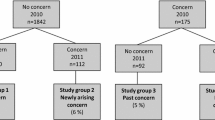Abstract
Rural parents are an often overlooked Child Find source. One hundred and seventy-nine parents were assessed to determine parents' ability to identify possible developmental delays and seek appropriate services. The results indicate that parent-orientated Child Find awareness campaigns must focus on: (1) increasing awareness of the role parents can play in early identification and reduce dependency on physicians, (2) heightening awareness of the importance of early intervention, (3) providing a mechanism to enable parents to detect developmental delays, (4) informating parents of services available to handicapped children and their families, and (5) informing parents of handicapped children's educational rights.
Similar content being viewed by others
References
Anastasiow, N. (Ed.),Preventing tomorrow's handicapped child today. Bloomington, Ind.: Institute for Child Study, 1977.
Childs, S. The family of the retarded child. In R. Koch & J.C. Dobson (Eds.),The mentally retarded child and his family. New York: Brunner/Mazel, 1971
Frankenberg, W.K., Dobbs, J.B., & Fandal, A.W.Denver development screning test: Manual. (Rev. ed.). Denver: University of Colorado Medical Center, 1970.
Laub, K.W. Kurtz, P.D., & Bagnoto, S.J. Finding and screening children in rural areas: Finding a needle in a haystack. Paper presented at the meeting of the National Association for the Education of Young Children, Dallas, 1975.
McWilliams, B.J. Various asects of parent counseling. In E. J. Webster (Ed.),Profesional approaches with parents of handicapped children. Springfield, Ill.: Charles C. Thomas, 1976.
Schrag, J. Idaho child find. InChild Find. Proceedings from the National Coordination Office for Regional and Resource Centers and the National Association of State Directors of Special Education. Washington, D.C.: March, 1975.
Wahler, R.G. The insular mother: Her problems in parent-child treatment.Journal of Applied Behavior Analysis, 1980,13, 207–219.
Werner, E., Bierman, J., & French, F.The children of Kauai. Honolulu: University of Hawaii Press, 1971.
Zehrback, R.R. Determining a pre-school handicapped population.Exceptional Children, 1975,42, 87–83.
Author information
Authors and Affiliations
Additional information
This project was funded by grant G007803105 from the U.S. Office of Education, Bureau of Education for the Handicapped to the RIP Advisory Committee, Inc., 2400 White Avenue, Nashville, TN.
Rights and permissions
About this article
Cite this article
Kurtz, P.D., Devaney, B. & Strain, P. Rural parents' attitudes and knowledge regarding handicapped preschool children: Implication for developing an early identification program. Child Youth Care Forum 12, 71–82 (1983). https://doi.org/10.1007/BF01258081
Issue Date:
DOI: https://doi.org/10.1007/BF01258081



